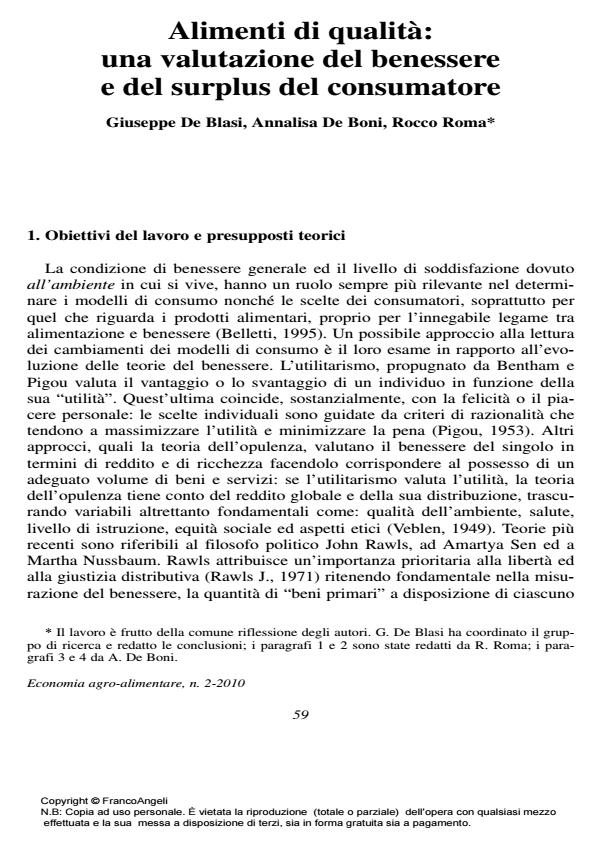Alimenti di qualità: una valutazione del benessere e del surplus del consumatore
Titolo Rivista ECONOMIA AGRO-ALIMENTARE
Autori/Curatori Giuseppe De Blasi, Annalisa De Boni, Rocco Roma
Anno di pubblicazione 2011 Fascicolo 2010/2
Lingua Italiano Numero pagine 15 P. 59-73 Dimensione file 823 KB
DOI 10.3280/ECAG2010-002005
Il DOI è il codice a barre della proprietà intellettuale: per saperne di più
clicca qui
Qui sotto puoi vedere in anteprima la prima pagina di questo articolo.
Se questo articolo ti interessa, lo puoi acquistare (e scaricare in formato pdf) seguendo le facili indicazioni per acquistare il download credit. Acquista Download Credits per scaricare questo Articolo in formato PDF

FrancoAngeli è membro della Publishers International Linking Association, Inc (PILA)associazione indipendente e non profit per facilitare (attraverso i servizi tecnologici implementati da CrossRef.org) l’accesso degli studiosi ai contenuti digitali nelle pubblicazioni professionali e scientifiche
The widespread wellbeing and the fulfillment for one’s own standard of living play a role more and more relevant to define consumer’s behavior in particular with regard to food consumption. Recently John Rawls, Amartya Sen and Martha Nussbaum overcoming conventional wellbeing theory approaches, putting together traditional wealth indicators (income, expenditure, property) with the evaluation of situations and experiences that people consider worthy of value. In developed countries food requirements are nearly completely satisfy and new choice models leads consumers to evaluate food, not only in relation to nutritional and health aspects, but, oftener and oftener, to: consumption opportunities, easiness to use, health contents, region of origin. The aim of this work is to evaluate the effects on consumer’s behavior of individual wellbeing level and pleasure for environment in which they live. First step of survey had the aim to evaluate consumer’s wellbeing level by traditional income indicators and data about consumers’ feeling of their own welfare. A sample of charger of family purchases has been selected and asked about their own satisfaction for economy, offices effectiveness, law and order, welfare, state education, spare time availability, environmental conditions. Afterward has been asked the willingness to pay (wtp) more than the market price for four group of food. The first group included "basic" foods, the others the "high quality" products such as "protected designation of origin", "ready to eat" and "health" foods. Each product demands curve has been drown by regression analysis and consumer surplus has been calculated as the difference between the higher observed consumer’s wtp and the amount he actually paid. The results of survey pointed out a positive relationship between consumer wellbeing and preferences for high quality foods. Happier consumer seem to perceive better than the others food quality features. A high wellbeing standard and a great fulfillment of one’s own life promote quality food demand more than income level. Every act to support and promote quality food demand will be more efficient in framework in which consumer have best standard of life.
Parole chiave:Foods consumer’s behavior, willingness to pay, demands curve
Jel codes:D1, D4, D6
Giuseppe De Blasi, Annalisa De Boni, Rocco Roma, Alimenti di qualità: una valutazione del benessere e del surplus del consumatore in "ECONOMIA AGRO-ALIMENTARE" 2/2010, pp 59-73, DOI: 10.3280/ECAG2010-002005